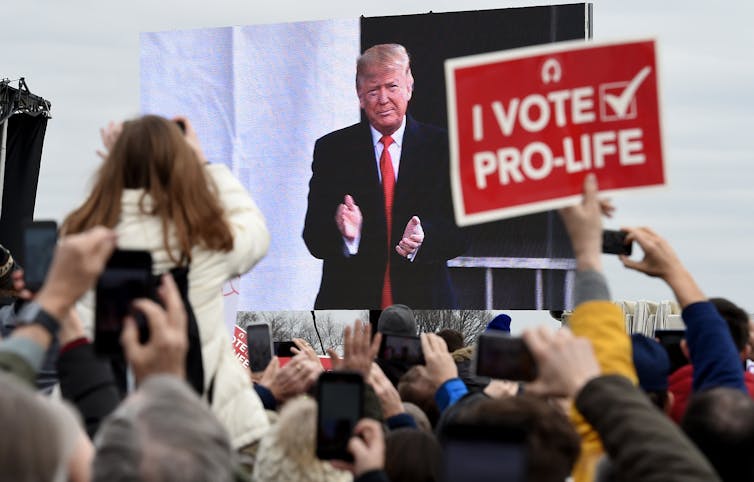Kamala Harris’ and Donald Trump’s records on abortion policy couldn’t be more different – here’s wha
Ahead of the election, a reproductive health law scholar lays out the broad strokes of what both Harris and Trump have done regarding abortion policy while in office.

Abortion is a critical, if not the most important, issue for many voters – especially women, according to polls – ahead of the U.S. presidential election in November.
Since Vice President Kamala Harris became the Democratic presidential nominee in August 2024, she has been vocal about her support for abortion rights. Specifically, she supports Congress passing a federal law that would protect abortion rights in the wake of the Supreme Court in 2022 overturning the landmark Roe v. Wade ruling, which recognized a constitutional right to abortion.
Republican presidential nominee Donald Trump, meanwhile, has boasted about nominating three Supreme Court justices who were among the court majority that voted in 2022 to abandon a constitutional right to abortion. However, in September 2024, Trump said he would not sign a federal abortion ban, reversing course from his previous statements. He also did not answer a question during the September presidential debate about whether he would veto legislation that bans abortion.
Harris and Trump have starkly different track records on abortion. As an academic, my scholarship focuses on reproductive health law, health care law and family law. In this piece, and in anticipation of the election, I briefly consider the broad strokes of each candidate’s past positions on and actions regarding abortion.
Harris’ abortion record
As California’s attorney general, Harris co-sponsored the Reproductive FACT Act, which, among other requirements, mandated that crisis pregnancy centers inform patients that they are not licensed medical facilities and that abortion services are available elsewhere. These centers are nonprofit organizations that counsel pregnant people against abortion, sometimes using deceptive tactics.
Anti-abortion groups sued to block the law once it went into effect. And, in 2018, the U.S. Supreme Court struck down the law on First Amendment grounds.
In 2017, Harris investigated the tactics of undercover videographers at Planned Parenthood clinics who, through deception and fraud, sought to entrap clinicians into making controversial, though legal, statements, and who possibly contravened state law on secret recordings.
As a U.S. senator, Harris opposed anti-abortion bills that would have conferred personhood rights on fetuses. None of them ultimately passed.
Conversely, Harris championed various bills that would have protected and advanced reproductive rights. In 2019, for example, Harris was a co-sponsor of the Women’s Health Protection Act, which would have enacted a federal statutory right to abortion. It also did not pass.
Finally, during Harris’ tenure as vice president, the Biden administration has used its executive power to ease barriers to abortion access, primarily through federal agency actions. The Food and Drug Administration, for example, removed a rule in 2021 that prohibited mailing medication abortion.
The Department of Health and Human Services issued guidance affirming that federal law requires emergency rooms to perform an abortion when it is medically necessary to stabilize a patient needing urgent care.
The Biden-Harris administration also supported federal legislation that includes accommodations for abortion. The Pregnant Workers Fairness Act, enacted in 2023, requires employers to provide time off for a worker’s miscarriage, stillbirth or abortion.
Although the Biden-Harris administration’s abortion policy is not necessarily based on just the vice president, Harris, since Roe’s reversal, has been at the helm of the administration’s “Fight for Reproductive Freedoms” tour, speaking nationally in support of a right to abortion. Harris has also stressed the damage done in 14 states, in particular, where abortion is banned throughout pregnancy or after six weeks of gestation.
Trump’s abortion record
During Trump’s tenure as president, he supported various changes – in the form of judicial appointments, federal funding and agency actions, some led by anti-abortion federal employees – in the service of making it harder for people to gain access to abortion care.
Trump began his presidency in 2016 by promising to appoint Supreme Court justices who would overturn Roe v. Wade. He nominated three justices – Brett Kavanaugh, Amy Coney Barrett and Neil Gorsuch – who joined the majority opinion in Dobbs v. Jackson Women’s Health Organization, reversing Roe in June 2022.
The Senate confirmed 226 judges whom Trump nominated to the lower levels of federal courts. Trump’s nominations followed a campaign pledge in 2016 that he “would appoint pro-life judges.” Some were on record as being against abortion, and some believed that embryos should be treated like children.
From the start, Trump’s administration prioritized defunding Planned Parenthood clinics, which offer abortion care and receive federal funding under the federal Title X program for other family planning services. Trump signed a bill in 2017 to allow states to strip funding from Planned Parenthood clinics and other organizations that offer abortion, even though abortion care was not supported by the Title X funding.
The Trump administration unsuccessfully tried to replace the Affordable Care Act and undermine its coverage for contraceptives as well as its neutral stance on insurance coverage for abortion. Trump supported bills such as the never-passed American Health Care Act to limit abortion coverage in private health insurance plans.
Trump also appointed several people with anti-abortion positions to his administration, including Charmaine Yoest, the former CEO for the anti-abortion group Americans United for Life, who served as a top communications official at the Department of Health and Human Services.
The Trump administration advanced numerous other anti-abortion policies. For instance, the Department of Human and Health Services’ 2017 strategic plan defined life as beginning at conception – a decision that supported funding for crisis pregnancy centers and abstinence-only education programs.

Finally, the Trump administration adopted an anti-abortion approach when it came to foreign policy. Trump reinstated and expanded the Mexico City Policy, also known as the Global Gag Rule, which prohibits foreign nongovernmental organizations that receive U.S. funding from performing abortions or referring patients for abortion care elsewhere. Under the Mexico City Policy, Trump in 2017 removed US$8.8 billion in U.S. foreign aid for overseas programs that provide or refer for abortions.
In 2017, Trump also suspended U.S. funding to the United Nations Population Fund, an agency focused on family planning for low-income people around the world, among other issues, which does “not promote abortion” but “supports the right of all women to get post-abortion care.” Biden restored funding to the U.N. agency in 2021.
In the coming weeks, both candidates will have a lot to say about abortion, possibly refining or changing their stances on aspects of abortion law. In assessing what both candidates have to say about how their administration will approach abortion, voters might consider what we know about their past actions.
Rachel Rebouché does not work for, consult, own shares in or receive funding from any company or organization that would benefit from this article, and has disclosed no relevant affiliations beyond their academic appointment.
Read These Next
Violent aftermath of Mexico’s ‘El Mencho’ killing follows pattern of other high-profile cartel hits
Members of the Jalisco New Generation Cartel have set up roadblocks and attacked property and security…
Crowdfunded generosity isn’t taxable – but IRS regulations haven’t kept up with the growth of mutual
Some Americans are discovering that monetary help they received from friends, neighbors or even strangers…
Algorithms that customize marketing to your phone could also influence your views on warfare
AI systems are getting good at optimizing persuasion in commerce. They are also quietly becoming tools…





